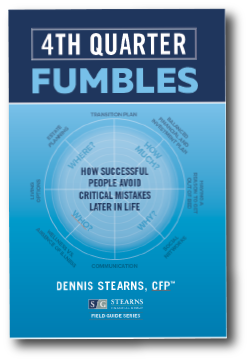Introduction to Fourth Quarter Fumbles
Excerpt from the Forward of Fourth Quarter Fumbles
…Retirement years, if one has sufficient assets, can and should be the most rewarding and significant years of our lives. We have the freedom we desired, the autonomy to pursue our bucket list of places, people and pursuits––and hopefully, the health to follow through on those desires. We need not make the mistakes that Dennis writes about, but we all have the potential to do so. Read this book and circle the chapter titles that remind you of your inclinations or circumstances. If you ever find yourself losing your grip on the situation, go back and read that chapter again.
Let’s finish this journey the best way possible…with both hands raised in the air!
— Mitch Anthony, Author, The New Retirementality
In addition to being a nationally recognized author and with experience in retirement planning, Mitch is also a columnist for Financial Advisor magazine and Marketwatch.com and a contributor to the Journal of Financial Planning. His daily radio feature, The Daily Dose, is heard on over 100 radio stations nationwide.
1st Chapter Excerpt
fumble
[fuhm-buh l]
verb (used without object), fumbled, fumbling.
1. to feel or grope about clumsily:
She fumbled in her purse for the keys.
2. Sports. to fumble the ball.
verb (used with object), fumbled, fumbling.
3.to make, handle, etc., clumsily or inefficiently: to fumble an attempt;
He fumbled his way through the crowded room.
4. Sports. to fail to hold or maintain hold on to a ball after having touched it or carried it.
noun
5. the act of fumbling: We completed the difficult experiment without a fumble.
6. Sports. an act or instance of fumbling the ball.
Synonyms
bungle, botch, mishandle, spoil, muff.
We all make fumbles during our lives. Some are small, like backing into a car in a parking lot. Some are big and create consequences for us and those we love for the rest of our lives. This book is about the big fumbles we can make in the fourth quarter of our lives and how to avoid them—or if we make them, how to minimize their damage and bounce back.
A 2016 study by the Employee Benefit Research Institute (EBRI) analyzed retirement satisfaction trends between 1998 and 2012. Almost 12% of retirees had switched from “very satisfied” to “moderately satisfied,” and many people declined to “not at all satisfied.” This happened in the highest asset quartile as well as lower quartiles. Why are people at the same financial circumstances and stage of the fourth quarter of their life declining in satisfaction levels from the late 1990s to current times?
Perhaps the greatest question is how could this be happening at the same time that people entering the fourth quarter believe they will live longer, at more healthy levels, and have more recreational opportunities than any generation in the history of humankind?
There are many explanations for the odd decline in satisfaction levels in the fourth quarter. The most common one is that we haven’t been prepared by our parents, mentors, or society for an extended last chapter of life. It’s a relatively new phenomenon that contains many opportunities, as well as numerous potential pitfalls, that previous generations never had to consider.
For those who have prepared well financially and emotionally for the fourth quarter, what would cause a dramatic turnaround in fortunes? Given health-care advances and longevity trends, how long could this fourth quarter last? Could it go into overtime? If they have a life partner, a common concern is whether their partner will be a helpmate or an anchor. Will their life partner be an asset near-term but a liability longer term?
The singles that I have interviewed share many of the same concerns that couples have, and they have additional concerns about entering this phase alone. They want to know what special risks lie ahead. Some singles shared that they jumped into relationships that they shouldn’t have just to hedge the risks of growing old. A few believed that this could be the first of many fumbles they would make but felt trapped and unable to adjust as they had earlier in life. After all, who gets divorced after age 65? Turns out, “gray divorce,” is sadly one of the fastest growing trends today.
Fortune favors the prepared, and few people prepare for the fourth quarter as they did for their career, family, and other major life events. Past generations didn’t need to prepare: The fourth quarter was often shorter than previous ones.
In the recent past, just 20 to 30 years ago, one spouse typically became chronically ill within 7 to 10 years after retirement (it was typically the husband) and the other spouse became the caregiver. One would usually die by age 70 or 75, and the other would be so worn out with caregiving roles that he or she wouldn’t last too much longer. This scenario still happens, of course, but for many people the good years now stretch out longer and there are more opportunities to spend money, help struggling children, and provide gifts or travel experiences for grandchildren.
Some of the stress reflected in the EBRI study can also be attributed to more challenging financial conditions during this time frame, including two very difficult recessions. It’s also likely that these changes in satisfaction levels can be traced to the media relentlessly highlighting the worst of everything happening all around the world, repeating the stories incessantly, giving the impression that the entire world is on the verge of collapse.
Many thought leaders in the healthy aging space that I interviewed think the issues outlined in Fourth Quarter Fumbles will cause the “very satisfied” numbers cited above to decline further, even for the people with no financial worries.
Read on to learn about the nine areas to consider upping your game to make the fourth quarter the best it can be.


